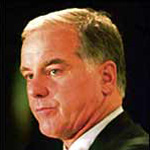By John Briggs
Published April 18th 2005 in Burlington Free Press
With city officials still stinging from repudiation by voters March 2 of the
city's plan to sell the waterfront Moran plant to the YMCA and give the
organization a 99-year ground lease for the adjoining 2.79 acres, the city
council tonight will consider a plan to let the public have its say on what to
do with the old building.
The options include tearing the building down or redeveloping it. The new approach is outlined in a hurriedly written five-phase draft plan, forwarded to the council from the city's Community and Economic Development Office.
The plan, designed to ensure "an inclusive public process on the future of the Moran Plant," as CEDO Director Michael Monte said in a cover letter, was prepared by the council's Parks, Arts and Culture Committee, the city's Planning Commission and staff and CEDO staff.
In the first phase, beginning this month, ideas will be solicited from the public on a Moran plant Web site, through mass e-mails, a postcard campaign and an "idea night" at the ECHO Center.
This summer, an Idea Technical Review Committee, to include developers, architects, planners and other professionals, will evaluate the ideas for "cost and benefit."
During phase three, in September, residents will be invited to public discussions to look at the ideas for the plant and vote on them.
In October and November, a survey based on the meetings will be distributed so the public can rank the ideas for the plant. Focus groups will then flesh out the ideas.
In March, using the new instant runoff voting method approved in March for the selection of the city's next mayor, residents will have the chance to formally rank the ideas for what to do with the plant through an advisory referendum question on the ballot. The draft plan promises the council will be kept apprised of progress throughout the year.
In other business, the council will:
Take up a resolution inspired by the recent rape and killing of Laura Winterbottom. Gerald Montgomery, a convicted sex offender, has been charged with murder. He has pleaded not guilty.
The resolution asks the state Legislature to take a look at a range of public safety issues, including whether the sex offender registry should be expanded to include offenders such as Montgomery, made more "user friendly" and altered to allow public searches for sex offenders by ZIP codes.
The resolution, broadly worded, also asks the Legislature to take a fresh look at monitoring convicts released into the community, "remembering that victims and community members have a right to have the most effective supervision strategies employed and be able to rely upon them to succeed, without creating a system that is unjust."
Hold a public hearing on this year's federal Community Development Block Grant awards. The citizen-based CDBG Advisory Board recommended public service grant awards next year of about $596,000 but had requests for more than $1 million.
The city has about $2.8 million in federal Housing and Urban Development money at its disposal this year.
Among the public service losers was the Salvation Army, which applied for the first time and requested $29,000 to pay for food for its free food kitchen, refurbishment of its classroom and for a new roof for its North Winooski Avenue Thrift Store.
The Salvation Army's development director, Michael Coughlin, said the kitchen provides free meals to an average of 85 to 115 persons a day, "depending on the season." Of the classroom, which is used to teach financial and other life skills, he said, "We see a great need. We see families who come to us generation after generation. We'd like to break the cycle."
The summary to the city's 2005 housing and community development "action plan" noted that because of decreased federal allocations, the advisory board was "forced to cut allocations for programs serving some of our residents who are most in need -- the homeless, children, the elderly and those with limited English proficiency."
The options include tearing the building down or redeveloping it. The new approach is outlined in a hurriedly written five-phase draft plan, forwarded to the council from the city's Community and Economic Development Office.
The plan, designed to ensure "an inclusive public process on the future of the Moran Plant," as CEDO Director Michael Monte said in a cover letter, was prepared by the council's Parks, Arts and Culture Committee, the city's Planning Commission and staff and CEDO staff.
In the first phase, beginning this month, ideas will be solicited from the public on a Moran plant Web site, through mass e-mails, a postcard campaign and an "idea night" at the ECHO Center.
This summer, an Idea Technical Review Committee, to include developers, architects, planners and other professionals, will evaluate the ideas for "cost and benefit."
During phase three, in September, residents will be invited to public discussions to look at the ideas for the plant and vote on them.
In October and November, a survey based on the meetings will be distributed so the public can rank the ideas for the plant. Focus groups will then flesh out the ideas.
In March, using the new instant runoff voting method approved in March for the selection of the city's next mayor, residents will have the chance to formally rank the ideas for what to do with the plant through an advisory referendum question on the ballot. The draft plan promises the council will be kept apprised of progress throughout the year.
In other business, the council will:
Take up a resolution inspired by the recent rape and killing of Laura Winterbottom. Gerald Montgomery, a convicted sex offender, has been charged with murder. He has pleaded not guilty.
The resolution asks the state Legislature to take a look at a range of public safety issues, including whether the sex offender registry should be expanded to include offenders such as Montgomery, made more "user friendly" and altered to allow public searches for sex offenders by ZIP codes.
The resolution, broadly worded, also asks the Legislature to take a fresh look at monitoring convicts released into the community, "remembering that victims and community members have a right to have the most effective supervision strategies employed and be able to rely upon them to succeed, without creating a system that is unjust."
Hold a public hearing on this year's federal Community Development Block Grant awards. The citizen-based CDBG Advisory Board recommended public service grant awards next year of about $596,000 but had requests for more than $1 million.
The city has about $2.8 million in federal Housing and Urban Development money at its disposal this year.
Among the public service losers was the Salvation Army, which applied for the first time and requested $29,000 to pay for food for its free food kitchen, refurbishment of its classroom and for a new roof for its North Winooski Avenue Thrift Store.
The Salvation Army's development director, Michael Coughlin, said the kitchen provides free meals to an average of 85 to 115 persons a day, "depending on the season." Of the classroom, which is used to teach financial and other life skills, he said, "We see a great need. We see families who come to us generation after generation. We'd like to break the cycle."
The summary to the city's 2005 housing and community development "action plan" noted that because of decreased federal allocations, the advisory board was "forced to cut allocations for programs serving some of our residents who are most in need -- the homeless, children, the elderly and those with limited English proficiency."
 On March 16th, Former Vermont Governor and Democratic National Committee Chair Howard Dean continued his support for instant runoff voting on Vermont Radio's Mark Johnson Show. Commenting on Burlington's recent IRV election, Dean said "I think the best and most democratic way to use to elect people in multiparty elections is instant runoff voting." Dean also supported the system when it was first used in Burlington in 2006.
On March 16th, Former Vermont Governor and Democratic National Committee Chair Howard Dean continued his support for instant runoff voting on Vermont Radio's Mark Johnson Show. Commenting on Burlington's recent IRV election, Dean said "I think the best and most democratic way to use to elect people in multiparty elections is instant runoff voting." Dean also supported the system when it was first used in Burlington in 2006. Citizens of Burlington, Vermont went to the polls on Tuesday, March 3rd to vote for the second time in an election using instant runoff voting. At 8:25 PM, the city declared that incumbent Mayor Bob Kiss had won reelection in the third and final round of counting, narrowly edging out challenger Kurt Wright, 51.5% to 48.5%. The race was unique in that it had four candidates that had a legitimate shot at winning: Progressive Kiss, Republican Wright, Democrat Andy Montroll, and independent Dan Smith. In most other American cities, there would be fear of "spoiler" candidates, but IRV allowed all four candidates to run without having to worry about being labeled "spoilers."
Citizens of Burlington, Vermont went to the polls on Tuesday, March 3rd to vote for the second time in an election using instant runoff voting. At 8:25 PM, the city declared that incumbent Mayor Bob Kiss had won reelection in the third and final round of counting, narrowly edging out challenger Kurt Wright, 51.5% to 48.5%. The race was unique in that it had four candidates that had a legitimate shot at winning: Progressive Kiss, Republican Wright, Democrat Andy Montroll, and independent Dan Smith. In most other American cities, there would be fear of "spoiler" candidates, but IRV allowed all four candidates to run without having to worry about being labeled "spoilers." On April 4, Vermont governor Jim Douglas chose to veto legislation to re-establish majority elections for Congress in his state through instant runoff voting. Vermont would have been the first state to enact IRV for Congress; legislative leaders affirmed their commitment to the bill, and it is sure to move in the state again. FairVote has worked hard to support this legislation, which likely generated more than 600 phone calls to the governor from Vermonters.
On April 4, Vermont governor Jim Douglas chose to veto legislation to re-establish majority elections for Congress in his state through instant runoff voting. Vermont would have been the first state to enact IRV for Congress; legislative leaders affirmed their commitment to the bill, and it is sure to move in the state again. FairVote has worked hard to support this legislation, which likely generated more than 600 phone calls to the governor from Vermonters.